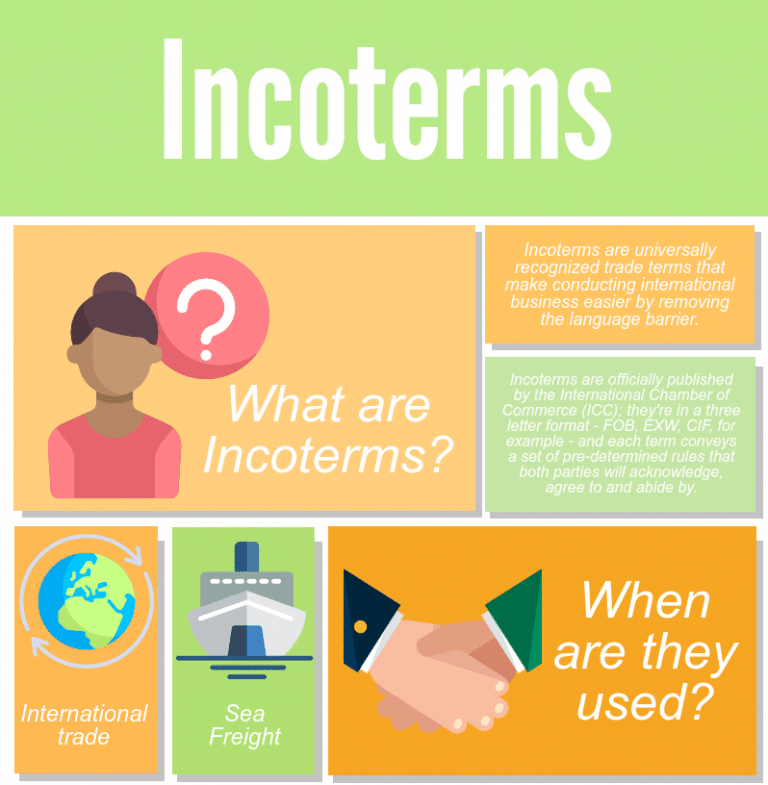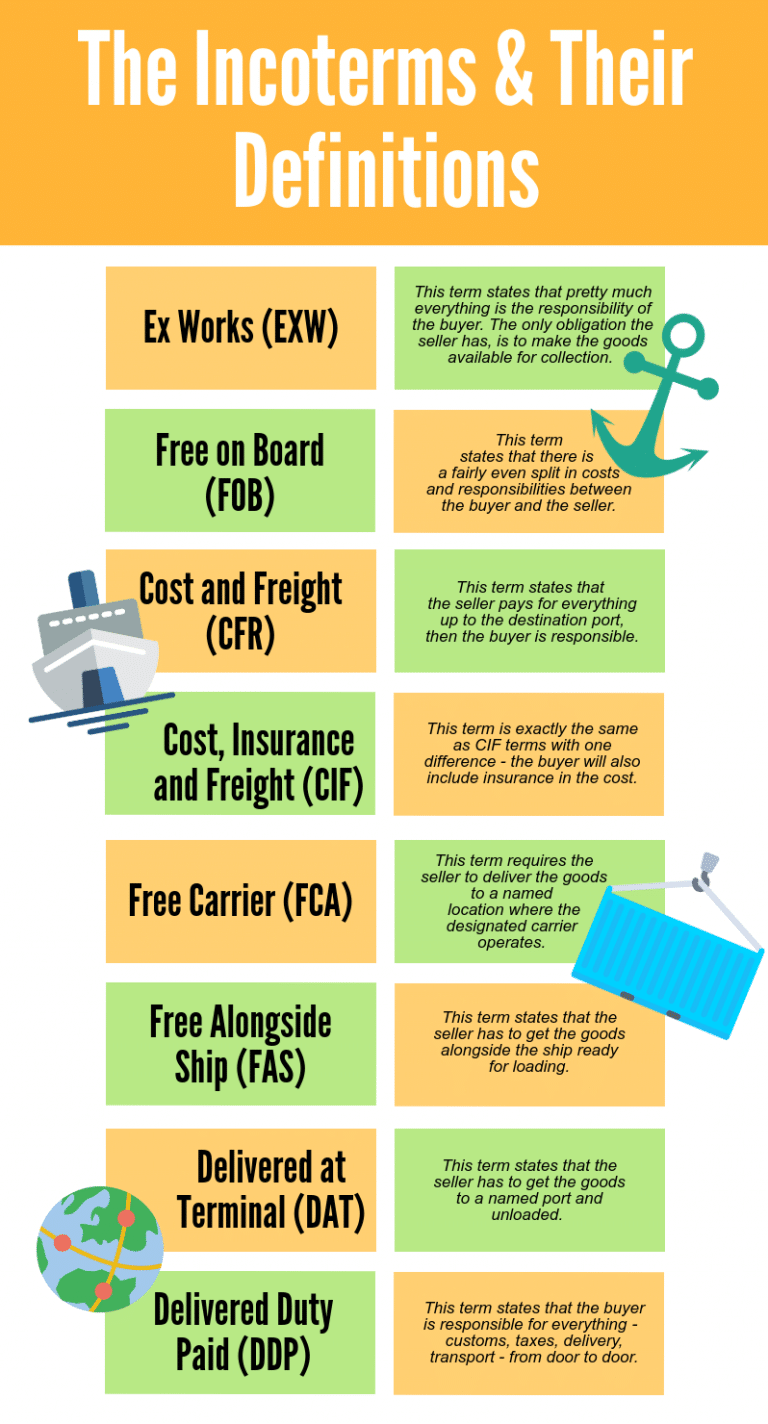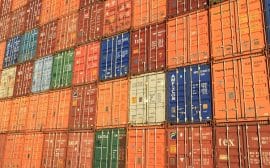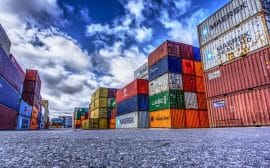-
Incoterms Definition
Incoterms (International Commercial Terms) are universally recognized trade terms that make conducting business with people in different countries easier by removing the language barrier. While commonly used for international business trading, they can also be used domestically.
Incoterms are officially published by the International Chamber of Commerce (ICC); they’re in a three letter format – FOB, EXW, CIF, for example – and each term conveys a set of pre-determined rules that both parties will acknowledge, agree to and abide by. Typically, these rules will be used to clearly allocate the tasks, costs, responsibilities and risks to the different parties during the transport and delivery of goods.
Save
-
What Are The Incoterms & What Do They Mean?
While there a number of Incoterms currently in use (they are changed/updated every few years). The most commonly used Incoterms are:
FOB (Free On Board)
FOB shipping terms are the most commonly used terms when importing goods from Asia; these terms are pretty much an even 50/50 split in cost and risk between the supplier and the buyer. They state that the seller’s responsibilities include everything up to getting the goods loaded onto the vessel at the agreed port. The first charge to the buyer is the freight costs and then they are responsible for all the costs to get the goods to their final destination. Click for more details
EXW (ExWorks)
EXW states that pretty much everything is the responsibility of the buyer. The only obligation the seller has, is to make the goods available for collection. The buyer pays all the costs to get the goods from the supplier to the final destination. When written, Ex Works shipping terms are often followed by the supplier’s collection address which is where the buyer’s responsibility starts. Click for more details
CFR (Cost and Freight)
When using CFR shipping terms, the seller’s invoice includes the cost of the goods, and the freight to send them to the agreed country. The seller pays for everything up to and including the freight to a named destination port, the first charge to the buyer is the terminal handling at the destination port. CFR terms can look attractive but in reality it’s very difficult for the buyer to control their costs. Click for more details
CIF (Cost, Insurance and Freight)
CIF terms are identical to CFR terms with one subtle difference. The buyer will also include insurance in the cost. The buyer pays for everything after the goods arrive at the destination just as in CFR terms. Like CFR terms, when using CIF terms it can be very difficult for the buyer to control their costs. Click for more details
Shippo; Sea Freight Transport, trends
The Incoterms that are less commonly used include:FCA (Free Carrier)
FCA shipping terms ✔️ require the seller to deliver the goods to a named location where the designated carrier operates. The seller also clears the goods for export from the country of origin. After this point all costs, risk and responsibility lies with the buyer.
FAS (Free Alongside Ship)
FAS terms are also followed by the named outbound port. This term states that once the seller has done everything up to getting the goods alongside the ship ready for loading they have fulfilled their obligations. This includes customs clearing the goods for export. The first charge for the buyer is terminal handling at the port of origin.
CPT (Carriage Paid To)
‘Carriage Paid To’ terms are very similar to CFR shipping terms, the difference being that CPT terms can be used in any mode of transport (Air/Sea etc).
CIP (Carriage and Insurance Paid)
These terms are very similar to CPT terms but they additionally include ‘maritime’ insurance. As stated in the name ‘Carriage and insurance paid to’ the seller takes all responsibility as in CPT terms but insurance is also paid by them.
DAT (Delivered At Terminal)
DAT shipping terms state that the seller bares all of the responsibility up to and including unloading the goods at the named terminal at the destination port. Customs clearance, import duties, taxes and delivery costs are paid for by the buyer.
DAP (Delivered at Place)
Delivered at place terms state that the seller pays for and takes responsibility for everything involved in the shipment all the way to delivering to an agreed destination. All the buyer pays for is import duties and taxes.
DDP (Delivered Duty Paid)
For the buyer, this is a great option for minimising risk. DDP terms mean that the buyer will purchase the goods before the seller pays all the costs to get the shipment to its destination. The seller also pays any import duties and taxes accrued in the buyer’s country of delivery. All the buyer has to do is unload their goods from the truck packed outside!
Shippo; shipping incoterms, trends
-
Incoterms For Different Modes Of Transportation
As there is a variety of ways that goods can be transported internationally, some Incoterms will only cover certain types of transportation. This is because certain Incoterms include rules that are only applicable to specific modes of transit.
Any Mode
The first set of Incoterms that we’ll look at are the ones that cover any mode of transport.
These include DAT, DDP and EXW. If you look at the requirements of these shipping terms, it’s clear why – there aren’t any method-specific requirements.
DAT (delivered at terminal) requires the seller to deliver to a terminal near the buyer and assume all risks, costs and responsibility until the goods reach the terminal – regardless of how they get there. From the terminal to the final destination, all responsibility is then passed onto the buyer.
DDP (delivered duty paid) means that the seller assumes absolutely all the costs and risks of the process – including the import and export costs. Due to this, there’s no switch in responsibilities or place where the buyer needs to take over and organise anything and no specific requirements other than to get the goods to the buyer. As a result, any shipping method can be used.
EXW (ex works) shipping terms have no requirements other than the supplier making sure that the goods are available to be picked up from the factory. From there, the buyer assumes all costs and responsibilities – and organises everything. This means that any shipping method can be used.Sea Freight
That being said, there are some Incoterms that can only be applied to a particular mode of transport. An example of this is sea freight – there are shipping terms that are exclusively used for sea freight. An example of these would be:
CIF (cost insurance and freight) and CFR (cost and freight) both require the buyer to get the goods to the destination port, while absorbing all the costs and responsibilities. The buyer is responsible for paying for customs clearance and delivery in the destination country. However, as the terms dictate they need to be delivered to a port, CIF and CFR are sea freight shipping terms.
Save
-
Explainer Video
You may also find this helpful:
FOB vs Ex Works | Shipping Term Showdown
If you’re still confused as to which shipping term to use (you won’t be the first or the last!) contact us on 0203 384 0498 or info@shippo.co.uk and we’ll help wherever we can.
Recent independent online Shippo feedback…
Fantastic company, great service, reasonable cost…
Trending; cfr incoterms, seafreight, inco terms





